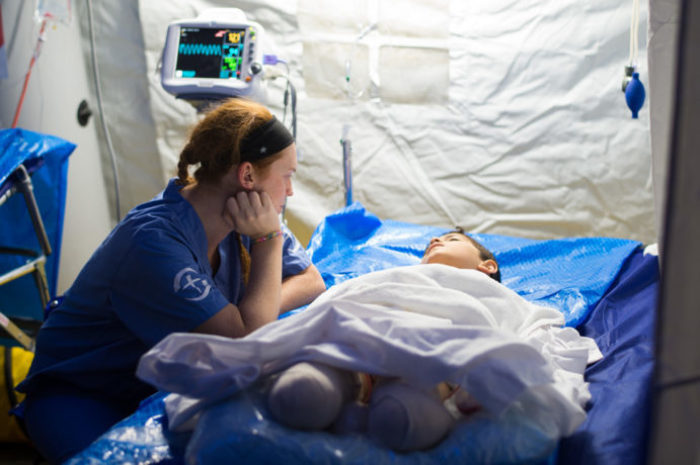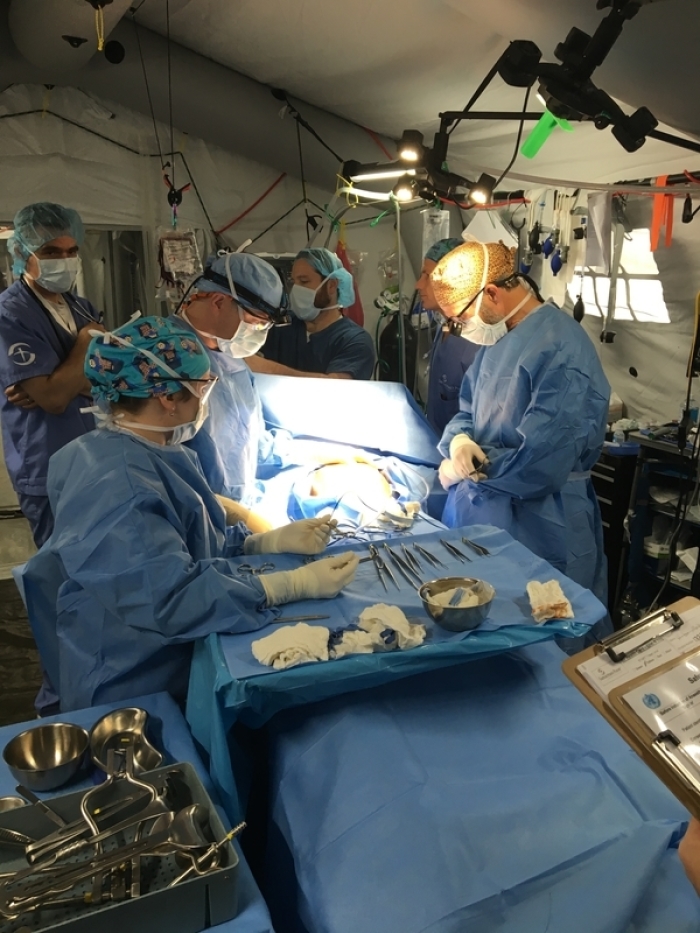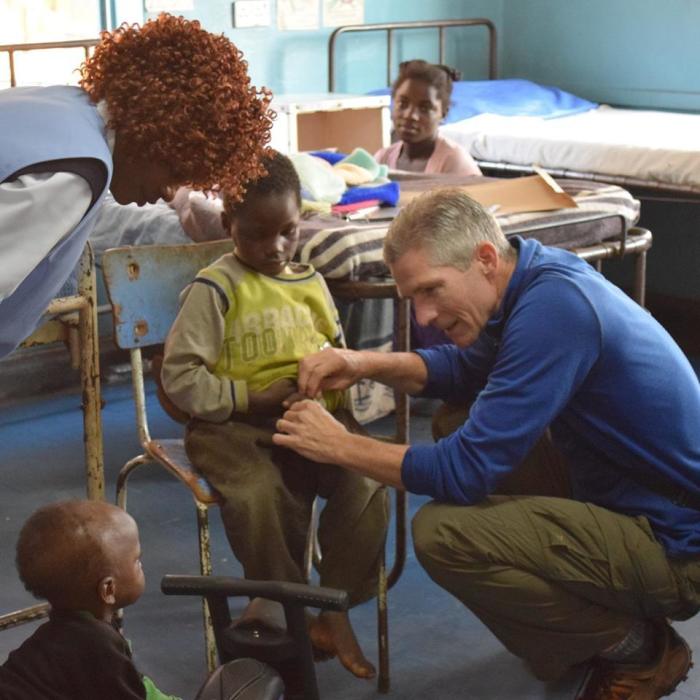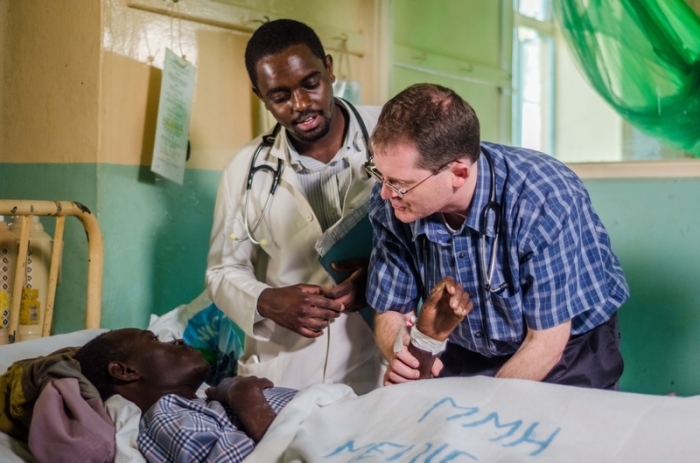Christian doctor recalls 'indescribable evil' he witnessed in Iraq; how God worked through medical missions

Dr. Paul Osteen will never forget the horrors he witnessed in Mosul, Iraq.
“I've never seen such indescribable evil in my life,” he told The Christian Post. “I thought I'd seen evil, but nothing compared to what I saw in Mosul: A sniper shot through a mother, killing her baby. Little ones, 2 and 3 years old, with legs and arms blown off. Just terrible, horrific stuff.”
A general and vascular surgeon, Osteen worked for two months at an emergency field hospital located 12 miles outside the Iraqi city during a time when hundreds of thousands of civilians were trapped by ISIS.
As part of a joint venture between the World Health Organization and Samaritan’s Purse, Osteen, the older brother of Joel Osteen, served as the hands and feet of Jesus to those devastated by war. Osteen recalled the story of one particular patient, a young man who needed a leg amputation due to injuries he suffered during the conflict.
“Every day, he would sit outside the ICU, and we would just greet him and touch him and let him know we were concerned,” Osteen said. “Before he was ready to leave our hospital to be transferred to a tertiary care facility, he said, ‘I want to experience the same God that you guys have.’”
“We couldn’t proselytize; we couldn’t really push our faith in any way,” he continued. “But just showing the love and kindness of God to those in an area where they’ve never seen that made a tremendous difference, whether it was to an ISIS warrior or just a civilian that was injured.”

Osteen’s work extends beyond the Middle East. In addition to serving on the pastoral staff at Lakewood Church, for four to six months each year, he, along with his family, travels to under-resourced countries in sub-Saharan Africa to relieve missionary doctors and surgeons while they go on furlough.
While in Western Zambia one year, a local physician told Osteen he was the only qualified surgeon in an area the size of Louisiana. In fact, many African countries, he said, have just one doctor for every 30,000 to 40,000 people.
“That struck me,” Osteen told CP, “because, for the majority of the year, these people can’t travel due to flooding. What happens when a 15-year-old has a complicated pregnancy? Nobody’s going to put her on a statistic anywhere. She’s going to die, and the baby is going to die.”

In that moment, Osteen said God spoke to him, telling him to use his experiences on the mission field to start the Mobilizing Medical Missions (M3) Conference. The annual event, which will be held Feb. 22–23, 2019, at Lakewood Church in Houston, Texas, brings together doctors, nurses, dentists and other health care professionals, as well as anyone who has a desire to use their skills to meet pressing global health care needs. More than 70 global mission organizations, including World Vision, will be at the M3 Conference.
“The conference has three goals,” Osteen said. “Number one is to connect people that have a heart to help people in remote parts of the world. Number two is to inspire attendees when they hear from men and women who are in the trenches with their fingernails dirty doing the work of global missions. Third, we hope people will get plugged into global health care missions.”
One keynote speaker at this year’s event is Dr. Jon Fielder, co-founder and chief executive of African Mission health care, a nonprofit strengthening mission hospitals to aid those in greatest need.
Fielder, who works as a consultant physician at Maua Methodist Hospital and has helped mission hospitals establish HIV clinics across Kenya, told CP that the need for adequate health care is “really, really overwhelming and over-matches the resources available.”
He cited statistics revealing that much of the functioning health care in Africa is provided by Christian medical missionaries from the West and their African Christian colleagues — not government NGO’s or other state-sponsored organizations.
“Mission hospitals tend to be more reliable, more competent, and more compassionate than those in the government system,” he said, adding that many of these hospitals train young Africans to be doctors, nurses, and other health care professionals, allowing them to better serve their local communities.
“They're training them both to be competent and qualified health care professionals, but also in a Christian context with Christian ethics and a Christian heart, modeling what it means to witness Christ as a health care provider,” he added. “These mission teaching hospitals have an outsized impact above and beyond the immediate numbers of people that they treat.”
Christian medical missions, Fielder emphasized, “needs to be primarily about the long-term.”
“There are so many problems that cannot be solved in a week, from high blood pressure to HIV and tuberculosis to need for a surgery and follow up,” he said. “Christian institutions that make a difference have been there for the long-term. I would encourage believers to think about how they can get involved and support a place that's well established.”

Christians are uniquely positioned to care for those in remote regions of the world, Osteen contended, because they are willing to “go the last mile” to care for the “least of these.”
“There’s something for every Christian in global missions,” he said. “You don’t have to be a health care provider; some of the greatest needs Christian mission hospitals have right now are for leadership training, for staff development, for diesel mechanics or electricians.”
“There’s a world out there that is hurting, and there are real things that we can do to make a difference,” Osteen continued. “I would invite everyone to come to the conference and see that there are real opportunities out there for everyone. This is a great way to put your foot into the water and see if God might move your heart to become involved with global missions.”
More than 70 global missions organizations will be at the M3 Conference — organizations that change lives, communities and nations. From healing the sick to drilling for clean water, caring for orphans, and fighting human trafficking. The M3 conference is about connecting expertise, interest and passion to the world’s needs.
To learn more, visit M3missions.com.





























